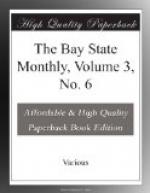* * * * *
PHILOSOPHIAE QUAESTOR.
The seeker of philosophical truth, which is described as the shadowy figure of a young girl, is, throughout, very expressive of desire and appreciation. The impressions she receives are those to which such a condition are most sensitive—the higher and more refined ones—and the responsive thoughts concern the nature and character of what is heard or felt. The elevation into classic importance of Concord, its philosophers, and its School of Philosophy is due to the influence of their history and teachings in American literature, and it is pleasant to recognize in this work such reverence of their classicism. Mrs. Anagnos has written a prose poem in which the last two sessions of the Concord School of Philosophy, which include that in memory of Emerson, and its lecturers excite her feeling and inspire her thought. It is sung in lofty strains that resemble those of the sacred woods and fount, and themselves are communicative of their spirit. It will be welcomed as an appropriate souvenir.—Boston Globe.
* * * * *
OUR NATIONAL FINANCES.
Mr. J.K. Upton used to be Assistant Secretary of the Treasury of the United States. Few men, therefore, have had better opportunities to inform themselves about our national finances. His volume, Money in Politics, published by D. Lothrop & Co., price $1.25, is a full history of the financial policy and legislation of this country. It is of the utmost value as a record, a book of reference, and an expression of sound theories. The intelligent reader cannot repress a feeling of shame that our national history in respect to finance should have been characterized by such continual bungling. The saddest feature in the case is the crass ignorance which Congress usually has displayed. Much of our legislation about money matters has been the merest experimenting, if not worse than this—the deliberate effort to enrich some one class of business men at the expense of the nation.
He utters a solemn warning of the dangers to which we now are exposed through our present acts of coinage and legal tender, whereby our gold coin sooner or later must be driven from the country and our standard must become a silver dollar of light weight and uncertain value. He also shows conclusively the futility of legislation in causing two substances to become and remain of the same value. Mr. Edward Atkinson has furnished the introduction to the book, in which he commends it warmly. While Congress continues to permit the coinage of $2,000,000 in silver a month, for which there is no demand and the coinage of which merely furnishes a market for the wares of a few owners of silver mines, it is difficult to overstate the need that such books as this should be circulated and studied attentively throughout the nation. Mr. Atkinson makes an impressive comment, which we quote:




